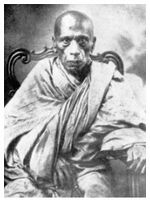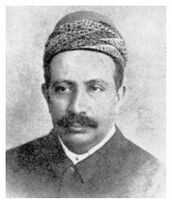208...
THEOSOPHY—THE ESSENCE OF PHILOSOPHY AND SCIENCE
[The original of the following fragment is in the Adyar Archives, namely, four odd sheets in H.P.B.’s handwriting; the above title was written by her on the back of the last sheet. The last paragraph gives an approximate clue to the date of this piece of writing, sometime in 1879.—Compiler.]
To obtain a glimpse of the first Theosophists, we will have to retrace the footsteps of hundreds of generations. To return for a moment to the dim traditions of “our abysmal past” as Mr. Tyndall would eloquently say—and name the four primitive Rishis—Agni, Vâyu, Aditya and Angiras, who, under the inspiration of the Omnipresent Spirit (Sarva Vipayas) gave utterance [to] the four Vedas.[1] It is such men as these who knew of no other Deity but that which dwelt in them as they felt themselves inseparable from It, that Emerson must have had in his mind when writing his Essay on the Oversoul.
Alone Emerson, one of the most transcendental idealists of our century, in his Essay on the Oversoul gives in a few words the most superb definition of the psychological states above referred to. Speaking of the commingling of the individual with the Universal Soul, he describes it by saying: “I, the imperfect, adore my own Perfect.” Among those


209
who come right under Vaughan’s definition of Theosophists, Emerson stands conspicuous. His writings, remarks a pious critic, would have been at once welcomed. . .” had it not been for some startling paradoxes and audacious statements, which, while they were in direct conflict with the theological beliefs of the people, were supported neither by facts nor arguments, but rested on the simple testimony of the author’s individual consciousness.” Rapidly passing by the uninterrupted series of subsequent mystics and Seers, we will stop to record but the founders of the six great schools of Indian Philosophy; then noting down Sankarâchârya, Kabir and a few others, pass onward to return to our starting point. And here, in the present century, we will find ourselves face to face with, and recognize as Brother Theosophists, such original thinkers as Swami Narayan, Ram Mohun Roy, Brahmachârya Bâwâ, Keshub Chunder Sen, and finally, last, though by far not least on our catalogue—Swami Dayananda Saraswati, the learned Pandit, eminent Vedic scholar and elocutionist, and the founder of the Aryan Reformation.
We could now retrace our steps once more, and begin a new nomenclature with the earliest Theosophists of the Aryan Greece. Whether the separation of the nations took place after the final establishment of the Aryan tribes who migrating southward possessed themselves of the “Seven Rivers,” or earlier, at that time, when the ancestors of the modern nationalities were all living together in more northern regions, it matters little; we still find in the oldest theosophies of the emigrants who now form the principal nations of Northwestern Asia and Europe the same metaphysical conceptions, hopes and aspirations—less dreamy, perhaps, but in some cases carried out as far as the speculations of the Indian Aryans. Professor Max Müller assigning to the migration of the latter, across the Himalayas, a period which he terms “the first dawn of traditional history,”[2] it is but fair to leave the question an open one, until further and stronger proofs are adduced to contradict the 210chronology of the ancient as well as of some modern Hindu scholars. It is sufficient for us to know, that all these nations had once lived together, thought together, and struggled in their attempts to solve the eternal problems, perceive the Unseen, and fathom the Incomprehensible. And as, according to the same great philologist, “there never was a nation believing so firmly in another world, and so little concerned about this . . . and, nowhere have religious and metaphysical ideas struck root so deep in the mind of a nation as in India.” Such ideas must have . . . [break in the MS.] . . . great flood of oblivion bits and scraps of the earliest records of contemporaneous writers to see that thus it ever was, and thus it ever must be. That each age furnishes the one and same characteristic in humanity, showing that, as nature itself—whether in its abstract or concrete sense—has its opposite poles, so Societies must ever be composed of two conflicting elements, subdivided into an infinity of smaller ones, which yet for that very law of opposite polarity, attract each other, thus equilibrizing and helping its onward and progressive motion. And that thus, men—especially philosophers—seem to be born only to disagree. As far back as history can reach, gods were constantly created and worshipped by one part, while pulled down and desecrated by the other. And, though Satire is more cruel than Medusa and as blind as blindfolded Themis, yet it has never proved its self-sufficiency as an argument, any more than a blow from a stronger hand has proved its right to stand to reason. Both, unless they kill on the spot, have to recoil some day before logic and reason. At Lucian’s Sale of Philosophers, the great Pythagoras is made to elbow the cynical Diogenes in his rags; and though one fetches ten minae and the other but two oboli, yet both—the immortal philosopher and the filthy Athenian mountebank are made to serve as the same target for the arrows of the iconoclastic Syrian humorist. Nevertheless, some historians, if not history, have dealt impartially with both and given in subsequent ages each its due. Often those, who have grappled the most fiercely with the superstitions and bigotry of their own age, find themselves reviled by a more fortunate successor in the following. 211Socrates was called for generations an infidel; Suidas, for pulling down the popular gods and endeavouring to unmask the pseudo-prophet of Paphlagonia, calls Lucian a “Blasphemer” . . .
“Union is strength” says the Wisdom of the ages. Having such a variety of enemies to contend with, a few scattered mystics and independent thinkers have joined four years ago into a small body. At the end of the year they had become a small army and their ranks are ever and continually increasing.
Footnotes